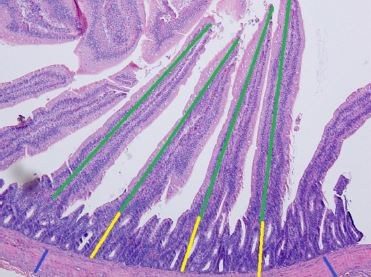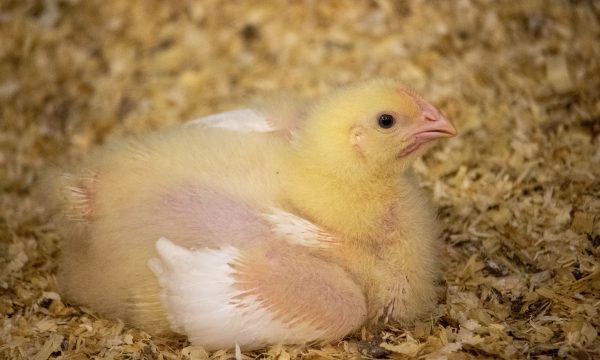Press release Zinc source for broilers affects performance, intestinal health and meat quality

Optimal intestinal health is crucial for good growth of poultry in general and broilers in particular. However, several factors such as climate change and higher ambient temperatures are increasing the pressure on the intestinal health of poultry. Zinc supplements can support broiler health in this respect. The essential trace element zinc is known to play a role in many biological processes, and zinc can be administered in various forms. In her PhD, ILVO/Ghent University researcher Annatachja De Grande investigated whether the source of zinc (inorganic or organic) affects intestinal morphology, technical performance and meat quality. The best results, especially during periods of stress, were achieved when an organic zinc amino acid complex was administered via broiler feed.
On 24 September 2020, Annatachja De Grande defended her doctoral thesis, 'Dietary zinc source affects performance and intestinal health in broilers'. Promotors are Prof. Dr. R. Ducatelle and Prof. Dr. F. Van Immerseel of Ghent University (Faculty of Veterinary Medicine) and Dr. Evelyne Delezie and Dr. Saskia Leleu (Flanders Research Institute for Agriculture, Fisheries and Food, ILVO).
Concerns about the intestinal health of broilers
A healthy intestine efficiently digests the nutrients from feed. This efficient digestion results in rapid weight gain and a lower feed conversion (in the case of broilers, more chicken meat from fewer kilos of feed). This is an economic and ecological win-win situation, provided that the animal stays healthy. In the last 20 years, however, specialists have become increasingly concerned about the intestinal health of broiler chickens. Intensive selection has resulted in hybrids that are highly susceptible to a variety of (intestinal) infections. In addition, high ambient temperatures, such as those observed during recent summers in Europe, lead to (additional) negative effects on the intestinal health of broilers.
Different types of zinc sources
Zinc is an essential trace element that supports many biological processes, possibly including intestinal health. As humans and animals do not have a specific 'storage system' for zinc, it has to be supplemented via feed or drinking water. Zinc can originate from different sources.
Inorganic sources of zinc include zinc oxide (ZnO) or zinc sulfate (ZnSO4)). Zinc can also take the form of an organic complex. The latter is composed of zinc bound to a protein, peptide or amino acid. Previous research has shown that organic zinc sources have a higher bioavailability, but little information is available on the effect of the zinc source on performance and intestinal health.
That is why Annatachja De Grande chose to compare the effects of adding an inorganic zinc source (ZnSO4) to broiler feed with those of an organic zinc source, more specifically a zinc amino acid (ZnAZ) complex. Technical performance, intestinal health and meat quality were determined.
Zinc amino acid complex delivers best results, especially in periods of stress.
The first study was a parallel performance and digestion test in broilers. This study showed that zinc, administered in the form of an organic ZnAZ complex, had a positive effect on feed conversion and intestinal health. The intestinal surface area was significantly larger in the ZnAZ group, allowing for better nutrient uptake. The effects were mainly noticed at the end of the starter phase (a phase characterized by high stress), and at the end of the growth phase.
In a second study broilers were subjected to chronic cyclic heat stress during the finishing phase. In this study the same zinc sources were used again, i.e. the inorganic ZnSO4 and the organic ZnAZ complex. In addition, vitamin E, an antioxidant, was added at a normal and a high level. The positive effects from the first study on intestinal morphology and feed conversion of ZnAZ were reconfirmed during the (stressful) starter phase. In addition, an effect of the zinc source in the finishing phase was seen in which the broilers experienced extra heat stress in this trial. The best results were also obtained with ZnAZ at a normal dose of vitamin E. However, a higher dose of vitamin E did not enhance this effect.
In this second trial, the effect of the zinc source on meat quality was also determined. The slaughter yield was not influenced by the type of zinc source, but a higher percentage of breast meat was recorded in the ZnAZ group. Moreover, this meat was characterized by reduced drip and thaw losses, indicating better meat quality for the breast meat from these chicks.
Conclusion
The intestinal health of broilers is a source of concern for farmers and veterinarians. A zinc supplement via the broiler feed can help, but the form of zinc (inorganic or organic) gives different effects. The doctoral research of Annatachja De Grande showed that administering zinc as an organic zinc-amino acid complex to broiler feed resulted in a more pronounced effect in comparison to providing zinc as an inorganic zinc source (ZnSO4). Especially during periods of stress, the organic zinc source had more positive effects on feed conversion, intestinal morphology and meat quality. However, the interaction with other anti-oxidative elements such as vitamin E needs to be further elucidated.


